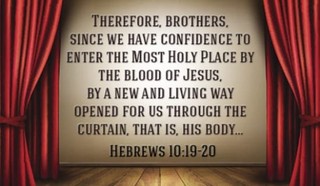- Recent Translations
- All Translations
Hebrews 10:22
Share
Settings
Hebrews 10:22 Meaning and Commentary
Let us draw near with a true heart
Either to the holiest of all, into which the saints have boldness to enter; or to Christ the high priest, who is entered there; or to the house of God, over which he is an high priest; or rather to God himself, as on a throne of grace, on the mercy seat in heaven, the most holy place: to "draw near" to him is a sacerdotal act, common to all the saints, who are made priests to God; and includes the whole of divine worship, but more especially designs prayer; to which believers are encouraged from the liberty and boldness they may have and use, of entering into the holiest by the blood of Jesus; from Christ's being the new and living way into it, and from his being an high priest over the house of God: the manner of drawing near is, "with a true heart"; not with the body only, but with the heart principally; with a renewed one, one that is right with God, and is single and sincere, is hearty in its desires, and upright in its ends.
In full assurance of faith;
in God, Father, Son, and Spirit; without faith, drawing near to God can neither be acceptable to him, nor of service to men; and a full assurance of faith, with respect to the object drawn nigh unto, and of the way unto him, and of acceptance with him through Christ, and of having the petitions put up to him granted, is very comfortable to believers, greatly becomes them, and is well pleasing to God:
having our hearts sprinkled from an evil conscience;
which is blind, inactive, partial, stupid, or guilty; and it is the blood of Christ, which being sprinkled on it by the Spirit of God, purges it from dead works, cleanses it from all sin, and speaks peace and pardon to it; and such may draw near with freedom and boldness, with readiness and cheerfulness, and with reverence and godly fear:
and our bodies washed with pure water;
not baptismal water, but the grace of the Spirit, which is often compared to water, in Scripture: the body, as well as soul, needs washing, and renewing; internal grace influences outward, actions, which adorn religion, and without which bodies cannot be presented holy to God. The allusion is to a custom of the Jews, who were obliged to wash their bodies, and make them clean, when they prayed. So Aben Ezra observes on ( Genesis 35:2 )
``that every Israelite, when he went to pray at a fixed place, was obliged to have (yqn wpwg) , "his body pure", and his garments pure.''So a priest might not enter into the court for service, though clean, until he had washed himself all over F26; and it is to sacerdotal acts that the reference is here.
F26 Misn. Yoma, c. 3. sect. 3. Vid. Philo de Victimas Offerent. p. 848.


